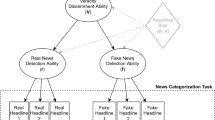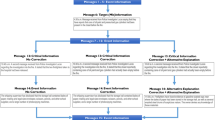Abstract
Research on decision making under uncertainty demonstrates that intuitive ideas of randomness depart systematically from the laws of chance. Two such departures involving random sequences of events have been documented in the laboratory, the gambler’s fallacy and the hot hand. This study presents results from the field, using videotapes of patrons gambling in a casino, to examine the existence and extent of these biases in naturalistic settings. We find small but significant biases in our population, consistent with those observed in the lab.
Similar content being viewed by others
References
Brown, William and Raymond Sauer. (1993). “Does the Basketball Market Believe in the Hot Hand? Comment,” American Economic Review 83, 1377–1386.
Cahart, Mark. (1997). “On Persistence in Mutual Fund Performance,” Journal of Finance 52, 57–82.
Camerer, Colin. (1989). “Does the Basketball Market Believe in the ‘Hot Hand’?” American Economic Review 79, 1257–1261.
Camerer, Colin. (1998). “Can Asset Markets be Manipulated? A Field Experiment with Racetrack Betting,” Journal of Political Economy 106, 457–482.
Chau, Albert and James Phillips. (1995). “Effects of Perceived Control Upon Wagering and Attributions in Computer Blackjack,” The Journal of General Psychology 122, 253–269.
Clotfelter, Charles and Phil Cook. (1989). Selling Hope: State Lotteries in America. Cambridge: Harvard University Press.
Clotfelter, Charles and Phil Cook. (1991). “Lotteries in the Real World,” Journal of Risk and Uncertainty 4, 227–232.
Clotfelter, Charles and Phil Cook. (1993). “The ‘Gambler’s Fallacy’ in Lottery Play,” Management Science 39, 1521–1525.
Estes, William. (1964). “Probability Learning.” In A.W. Melton (ed.), Categories of Human Learning. New York: Academic Press.
Ethier, Stuart. (1982). “Testing for Favorable Numbers on a Roulette Wheel,” Journal of the American Statistical Association 77, 660–665.
Gilovich, Thomas, Robert Vallone and Amos Tversky. (1985). “The Hot Hand in Basketball: On the Misperception of Random Sequences,” Cognitive Psychology 17, 295–314.
Golec, Joseph and Murray Tamarkin. (1998). “Bettors Love Skewness, Not Risk, at the Horse Track.” Journal of Political Economy 106, 205–225.
Langer, Ellen. (1975). “The Illusion of Control,” Journal of Personality and Social Psychology 32, 311–328.
Laplace, Pierre. (1820: 1951) Philosophical Essays on Probabilities, translated by F. W. Truscott and F. L. Emory. New York: Dover.
Metzger, Mary. (1984). “Biases in Betting: An Application of Laboratory Findings,” Psychological Reports 56, 883–888.
Mullainathan, Sendhil. (2002). “Thinking Through Categories,” Working Paper, Department of Economics, Massachusetts Institute of Technology.
Odean, Terrence. (1998). “Are Investors Reluctant to Realize their Losses?” Journal of Finance 53, 1775–1789.
Quandt, Richard. (1986). “Betting and Equilibrium,” Quarterly Journal of Economics 101, 201–207.
Rabin, Matthew. (2002). “Inference by Believers in the Law of Small Numbers,” Quarterly Journal of Economics 157, 775–816.
Ritov, Ilana and Jonathan Baron. (1992). “Status Quo and Omission Bias,” Journal of Risk and Uncertainty 5, 49–61.
Samuelson, William and Richard Zeckhauser. (1988). “Status Quo Bias in Decision Making,” Journal of Risk and Uncertainty 1, 7–59.
Shefrin, Hersh and Meir Statman. (1985). “The Disposition to Sell Winners Too Early and Ride Losers Too Long: Theory and Evidence,” Journal of Finance 40, 777–790.
Sirri, Erik and Peter Tufano. (1998). “Costly Search and Mutual Fund Flows,” Journal of Finance 53, 1589-1622.
Sundali, James and Rachel Croson. (2004). “Biases in Casino Betting: The Hot Hand and the Gambler’s Fallacy,” Working Paper, The Wharton School, University of Pennsylvania.
Terrell, Dek. (1994). “A Test of the Gambler’s Fallacy: Evidence from Pari-Mutuel Games,” Journal of Risk and Uncertainty 8, 309–317.
Terrell, Dek. (1998). “Biases in Assessments of Probabilities: New Evidence from Greyhound Races,” Journal of Risk and Uncertainty 17, 151–166.
Terrell, Dek and Amy Farmer. (1996). “Optimal Betting and Efficiency in Parimutuel Betting Markets with Information Costs,” The Economic Journal 106, 846–868.
Tversky, Amos and Daniel Kahneman. (1971). “Belief in the Law of Small Numbers,” Psychological Bulletin 76, 105–110.
Wagenaar, Wilhelm. (1988). Paradoxes of Gambling Behavior. London: Lawrence Erlbaum.
Walker, Mark and John Wooders. (2001). “Minimax Play at Wimbledon,” American Economic Review 91, 1521–1538.
Author information
Authors and Affiliations
Corresponding author
Additional information
JEL Classification: C9 Experimental, C93 Field Experiments, D81 Decision Making under Risk and Uncertainty
Rights and permissions
About this article
Cite this article
Croson, R., Sundali, J. The Gambler’s Fallacy and the Hot Hand: Empirical Data from Casinos. J Risk Uncertainty 30, 195–209 (2005). https://doi.org/10.1007/s11166-005-1153-2
Issue Date:
DOI: https://doi.org/10.1007/s11166-005-1153-2




